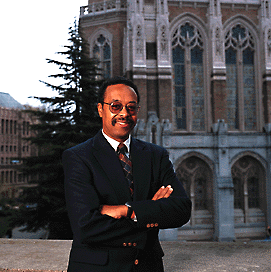

It's not surprising then that the associate professor of sociology is one of the recipients of the University's 1997 distinguished teaching awards. As Sociology Chair Charles Hirschman said in supporting Crutchfield's nomination for the award:
"He is one of the few faculty members who does it all -- teaching, scholarship, mentoring students, service to the University and to the broader profession -- and he does it with grace and aplomb. In a department with a tradition for excellence in teaching, Bob Crutchfield stands out as one of our stars. He teaches large classes of 300-plus students and medium- size seminars of 40, drawing rave reviews in all of them."
Crutchfield arrived at the University of Washington 18 years ago and has made important contributions toward improving teaching throughout his career. He is one of the founders of Large Lecture Instructors, an informal group for people who teach the biggest classes on campus, and other programs to help teachers.
"Bob has dedicated himself to changing the culture and quality of teaching at this university," says a colleague . "His commitment to helping others improve their teaching is unparalleled among the faculty."
Crutchfield graduated from a small Pennsylvania institution, Thiel College, and his original plan was to earn his master's degree in sociology and then teach at a small college. Instead, he became fascinated with doing sociological research at Vanderbilt University, earning a Ph.D. His teaching plans regained center stage when he was hired by the UW in 1979.
Throughout his career at the UW, Crutchfield has taught large classes and has mastered the art of keeping the attention of the overwhelming majority of up to 450 students
"One thing I try is to find a way to `shrink' classes because the students don't like large ones," he explains. "I don't assume I can't have a discussion because there are 300 people in the room. I try to interact with students."
One of the ways he foster interaction is through the use of one-minute essays. Near the end of a class, he'll ask his students to summarize the main points of a lecture or discussion, to answer a question he poses, or to ask questions of him. The essays are ungraded, but students are expected to turn them in and Crutchfield reads them.
"The essays are an opportunity to find out where my students are and if they get my main point. They also give students who won't speak up before several hundred people a chance to say something to me each day," he says.
Crutchfield also has played a significant role in mentoring minority students. "I never had a black instructor when I was a student, because there weren't any in my field. Being a model is an important contribution I can make. But a larger issue is that scholarship runs deep in African people, so it is important for majority students to see Africans and other minorities as scholars and that they see that scholarship is a universally valued tradition," he says
"I hope I can be a role model for Latino, Asian, Native American and white students, as well as for African students. A lot of students of color need minority role models, but we shouldn't be too narrow in who should be role models for whom," he adds. "Diversity is very important." --Joel Schwarz, UW News and Information
Crime and Puzzlement, a Columns feature article on Crutchfield's research into the dropping U.S. crime rate.
Return to "Best of 1997" Title Page
Send a letter to the editor at columns@u.washington.edu.